You found our list of the best time management books of all time.
Time management books are guides that help readers organize tasks and use hours more effectively. These works cover topics such as organization, focus, and defeating procrastination. The purpose of these books is to help professionals arrange their work lives for optimal output and minimal stress.
These works are similar to habit books, business books, office management books, and books on professional strategy. The books include time management tips.
This list includes:
- books on time management and productivity
- time and stress management books
- time management improvement books
- time management leadership books
- time management and organization books
Here we go!
List of time management books
Here is a list of new and bestselling books on time management for professionals who want to achieve more and stress less.
1. Deep Work: Rules for Focused Success in a Distracted World by Cal Newport
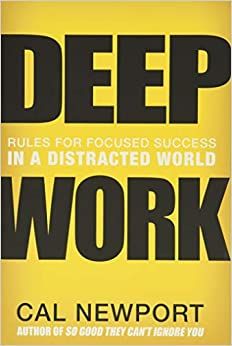
Deep Work is one of the best books on time management and productivity. This guide presents a masterclass in tuning out distractions and hyperfocusing. The book explores the merits of an unflinching work ethic, and explains guidelines and training methods for concentrating. The book’s second half lays out tips for working more efficiently, including baring boredom, blocking out social media, preventing interruptions, and achieving peak “deep work.” Deep Work is an actionable guide for learning how to focus intentionally in a world where constant disturbances battle for our attention.
Notable Quote: “Efforts to deepen your focus will struggle if you don’t simultaneously wean your mind from a dependence on distraction.”
Read Deep Work.
2. Getting Things Done: The Art of Stress-Free Productivity by David Allen
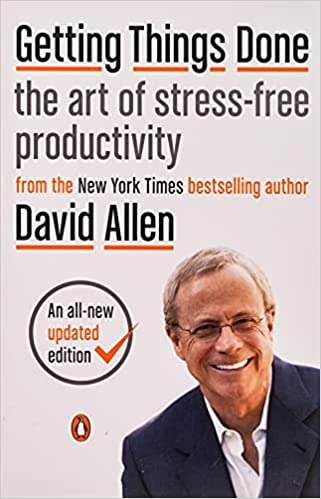
Getting Things Done is one of the best selling time management improvement books. This edition is an updated version of the classic guide to managing tasks and mastering workflow. The text presents organizational systems and best practices that help readers accomplish more tasks and worry less, including visuals like flow charts. The central idea of this book is that human brains can only store and focus on limited amounts of information at one time, and tackling tasks as they come can prevent overwhelm. Acting swiftly prevents responsibilities from piling up or getting forgotten. Getting Things Done presents a GTD system that helps readers organize workflows and react appropriately to prompts.
Notable Quote: “If you don’t pay appropriate attention to what has your attention, it will take more of your attention than it deserves.”
Read Getting Things Done: The Art of Stress-Free Productivity.
Want some free team building tools?
$49 value (100% free)
- 100+ fully tested icebreaker questions
- 24+ themed Bingo generators
- 5+ PDFs (including the 8% Rule)
- 2024 team building calendar
- and more...

Enter your email for instant access
3. The 7 Habits of Highly Effective People: Powerful Lessons in Personal Change by Stephen Covey
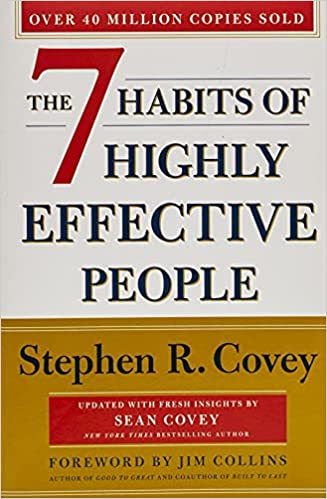
The 7 Habits of Highly Effective People is one of the most popular time management books of all time. This classic highlights practices that separate productive individuals and high achievers from the rest of the population.
These seven habits are as follows:
- Be proactive
- Begin with the end in mind
- Put first things first
- Think win/win
- Seek first to understand, and then to be understood
- Synergize
- Sharpen the saw (aka, take time to recharge)
Covey explores each habit in depth and illustrates his points by using concrete anecdotes. The book offers advice on how to embody these traits and become more successful in personal and professional life. The 7 Habits of Highly Effective People teaches readers how to take control of each moment and stop wasting time on inefficient actions.
Notable Quote: “But until a person can say deeply and honestly, “I am what I am today because of the choices I made yesterday,” that person cannot say, “I choose otherwise.”
Read The 7 Habits of Highly Effective People.
4. Eat That Frog!: 21 Great Ways to Stop Procrastinating and Get More Done in Less Time by Brian Tracy
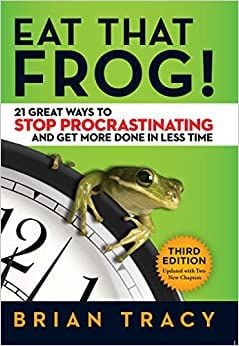
Mark Twain famously said, “if it’s your job to eat a frog, it’s best to do it first thing in the morning. And If it’s your job to eat two frogs, it’s best to eat the biggest one first.” This book revolves around that philosophy. Brian Tracy prescribes ways to beat procrastination and gain momentum by tackling the most challenging tasks head on. The book offers tips like planning the day ahead of time, cutting big tasks into smaller chunks, reminding yourself of consequences, and using technology to your advantage.
Notable Quote: “One of the very worst uses of time is to do something very well that need not to be done at all.”
Read Eat That Frog!
5. 168 Hours: You Have More Time Than You Think by Laura Vanderkam
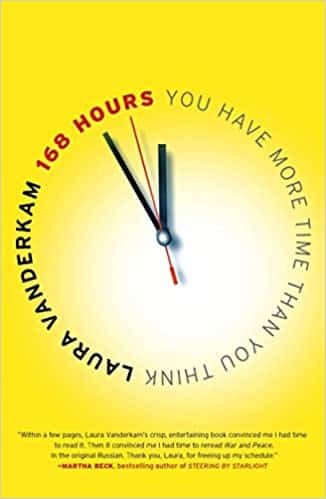
168 Hours provides a framework for how to structure your days in ways that leave time to do what is important to you. Laura Vanderkam aims to overturn the myth of the time crunch, and challenges readers to clear their weekly to-do lists by prioritizing the most important tasks and offloading nonessentials. The main parts of the book explain how to structure time at home and at work to build a well-rounded, active life. 168 Hours offers a breakdown of how to best use limited time to live a fulfilling life.
Notable Quote: “Knock a few of these easy items off first, then look for ways to minimize more complicated time traps.”
Read 168 Hours: You Have More Time Than You Think.
6. The 80/20 Principle: The Secret to Achieving More with Less by Richard Koch
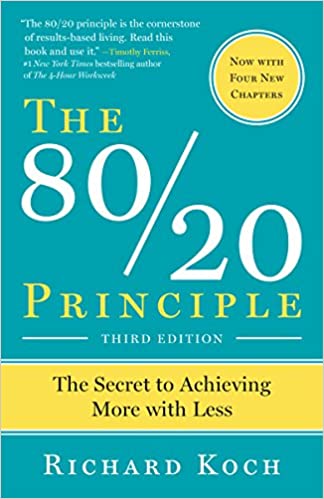
The 80/20 Principle is a manifesto for accomplishing great results with minimal effort. The 80/20 rule asserts that 80% of results come from 20% of efforts. By this logic, the key to success is not to stay busy, but rather to invest the most energy and focus into the 20%, or the most essential priorities and tasks. The first part of the book explains the idea in depth, tracing the history and exploring related academic concepts. The middle section focuses on applying the 80/20 concept to the corporate world, and gives advice on topics like employing simple strategies and finding the right customers. The book ends with reflections on how to reduce time waste, reclaim free time, and operate more efficiently in all aspects of life.
Notable Quote: “It is not shortage of time that should worry us, but the tendency for the majority of time to be spent in low-quality ways.”
Read The 80/20 Principle.
7. When: The Scientific Secrets of Perfect Timing by Daniel Pink
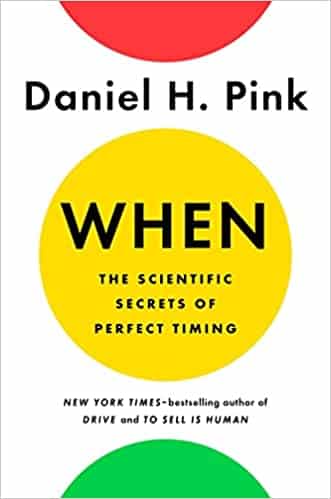
When: The Scientific Secrets of Perfect Timing is a deep dive into the world of timing. Daniel Pink relies on sciences, psychology, sociology, and economics to draw conclusions about how timing affects motivation and success. Pink uses a combination of data and anecdotes to illustrate patterns and points and craft a compelling read. The book explores topics such as the emotional significance of beginnings, middle, and endings, the restorative power of breaks, and the art of team synchronization. When: The Scientific Secrets of Perfect Timing shows how you can achieve more and better manage your time by embracing inertia and choosing the opportune moment to act.
Notable Quote: “If we stick with a task too long, we lose sight of the goal.”
Read When.
8. Essentialism: The Disciplined Pursuit of Less by Greg McKeown
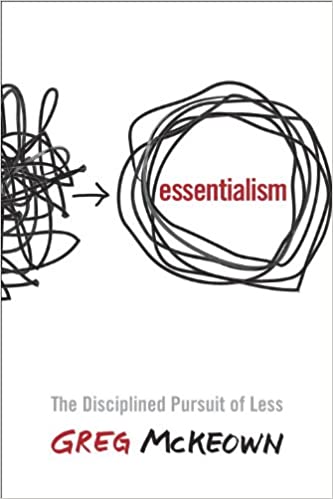
Essentialism: The Disciplined Pursuit of Less is one of the most helpful time and stress management books. Greg McKeown advocates not for doing more, but doing what is essential. In other words, prioritizing the most critical tasks and honing in on the most important ideas. While many folks boast about having hectic schedules, this book explains how staying busy is actually a less disciplined approach. Focusing on the right areas and committing to a singular task is more of a challenge than multitasking. Each chapter focuses on a simplifying behavior such as making decisions, setting boundaries, and removing obstacles. Essentialism: The Disciplined Pursuit of Less is a manifesto on minimalism, self-care, and frictionless work.
Notable Quote: “Essentialists see trade-offs as an inherent part of life, not as an inherently negative part of life. Instead of asking, “What do I have to give up?” they ask, “What do I want to go big on?”
Read Essentialism: The Disciplined Pursuit of Less.
9. The Productivity Project: Accomplishing More by Managing Your Time, Attention, and Energy by Chris Bailey
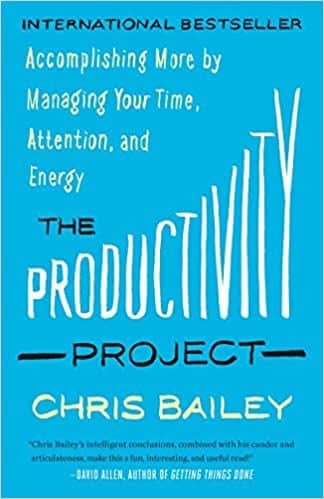
The Productivity Project is a study that centers around finding ideal working conditions. Over the course of a year, author Chris Bailey conducted a series of productivity experiments on himself and recorded his results. In the process, he gained valuable insights about time management, which he is now sharing in this book. Bailey shares the actions that had the biggest impact on his output, for example, slow down and work more deliberately, and schedule less time for important tasks. The book pairs these first person experiences and observations with research and interviews with leading productivity experts. The Productivity Project is a collection of tested techniques that serves as a reminder that work is not just about the amount of time spent, but the yields of that time.
Notable Quote: “Busyness is no different from laziness when it doesn’t lead you to accomplish anything.”
Read The Productivity Project.
10. Organize Tomorrow Today: 8 Ways to Retrain Your Mind to Optimize Performance at Work and in Life by Jason Selk,Tom Bartow, and Matthew Rudy
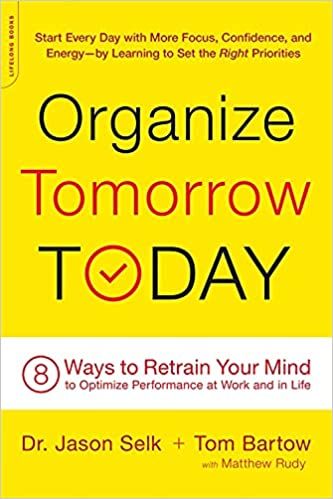
Organize Tomorrow Today is a book that emphasizes the role mindset plays in time management. Dr. Jason Selk is a performance coach that trains top athletes and executives, and Tom Bartlow is a former college basketball coach who became a top-grossing financial advisor. The authors use their sports backgrounds to preach the mental aspects of performance. The book shows that time management is a matter of willpower and practice. Chapters cover topics such as plotting out your days, persevering through difficult times, pep-talking yourself and others, and working under pressure. One of the book’s most useful tips is to get into the habit of starting continually rather than aiming to work continuously for eight hours. Organize Tomorrow Today is a practical playbook for hardwiring your mind for productivity and long-term success.
Notable Quote: “Greatness is predicated on consistently doing things others can’t or won’t do. Simply put, success is not about being brilliant. It is about being consistent.”
Read Organize Tomorrow Today.
11. Clockwork: Design Your Business to Run Itself by Mike Michalowicz

Clockwork: Design Your Business to Run Itself is one of the best time management leadership books. This book teaches owners, entrepreneurs, and bosses how to stop micromanaging and gain more free-time through careful design. This guide shows owners how to empower staff to solve problems instead of spending time constantly putting out fires. Mike Michalowicz shows entrepreneurs how to build systems that operate smoothly without constant interference or guidance, and helps owners reclaim free time instead of working constantly and being on-call 24/7. Clockwork is the ultimate guide for running a business instead of letting it run you. The book is a crash course in time management for managers.
Notable Quote: “It turns out that productivity doesn’t get you out of the doing: it just gets you doing more.”
Read Clockwork, and check out more books on management.
12. Four Thousand Weeks: Time Management for Mortals by Oliver Burkeman

Four Thousand Weeks is one of the newest books about managing time. This work takes a more philosophical and spiritual approach compared to most books in the genre. Drawing on historical evidence, psychological principles, and the musings of great thinkers, Oliver Burkeman challenges modern productivity norms and questions the quest to stay forever busy. Four Thousand Weeks reminds readers that life is short, and suggests strategies for spending time on meaningful pursuits. The book also explains how to overcome anxiety over the uncontrollable and be more mindful of the moment instead of projecting into the future.
Notable Quote: “The real problem isn’t our limited time. The real problem–or so I hope to convince you– is that we’ve unwittingly inherited, and feel pressured to live by, a troublesome set of ideas about how to use our limited time, all of which are pretty much guaranteed to make things worse.”
Read Four Thousand Weeks.
13. Make Time: How to Focus on What Matters Every Day by Jake Knapp and John Zeratsky
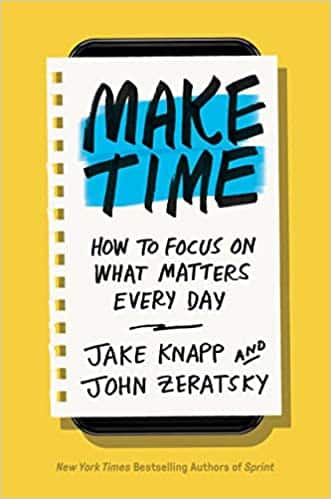
Make Time is one of the greatest time management and organization books. Jake Knapp is a veteran of Google and the creator of the company’s design sprint, while John Zeratsky is a journalist whose work on technology companies has appeared in The Wall Street Journal, Harvard Business Review, and Time. The authors show how to take control of your attention and say no to things that do not serve you. This book presents time management as an intentional practice that involves putting on blinders to the demands of modern life and narrowing in on the most meaningful tasks, projects, and pursuits. Make Time offers a toolkit to take control of your schedule and
Notable Quote: “Perfection is a distraction—another shiny object taking your attention away from your real priorities.”
Read Make Time.
14. Time Management in 20 Minutes a Day: Simple Strategies to Increase Productivity, Enhance Creativity, and Make Your Time Your Own by by Holly Reisem Hanna

Time Management in 20 Minutes a Day is a short and simple guide to getting the most out of each day. The book is around 100 pages, yet is chock full of useful tips and information and contains very little fluff. Holly Reisem Hanna offers practical and actionable tips to save time such as setting up automatic email filters, scheduling designated time to check your inbox, creating virtual filing systems and to-do lists, and making “stop-doing” lists. The author offers doable basic instructions and suggestions instead of merely preaching time management philosophy. The book also includes lists of time management resources, productivity apps, and time-saving services that can further help readers reclaim hours of their days.
Notable Quote: “Creating new habits and introducing new strategies takes time and effort. You can’t just snap your fingers and instantly become more productive. You have to be willing to do a little work on the front end so that you can reap the benefits on the back end.”
Read Time Management in 20 Minutes a Day.
15. The 4-Hour Workweek: Escape 9-5, Live Anywhere, and Join the New Rich by Tim Ferriss
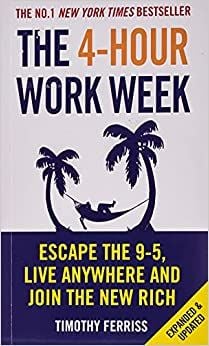
The 4-Hour Workweek is one of the most popular books on time management of all time. In this bestseller, Tim Ferriss suggests strategies for increasing income without increasing workload. For instance, by outsourcing tasks, embracing automation, and working in bursts. The book backs up these claims with case studies and examples of successful practitioners of this lifestyle. The 4-Hour Workweek urges readers to enjoy life in the moment instead of delaying gratification until retirement, and lays out a blueprint for an alternative professional life that does not involve working around the clock.
Notable Quote: “Someday” is a disease that will take your dreams to the grave with you. Pro and con lists are just as bad. If it’s important to you and you want to do it “eventually,” just do it and correct course along the way.”
Read The 4-Hour Workweek.
Final Thoughts
If you struggle with your to-do list, then you may think that the last thing you should do is to stop and read a book. However, investing a few hours to read books on time management can help you learn new techniques to structure your day and help you to become more productive and efficient.
For more reading, check out this list of organizational behavior books and these focus books.
Next, check out our list of the best Pomodoro timers to help manage your time, and we also have a guide to 4 day workweeks.
